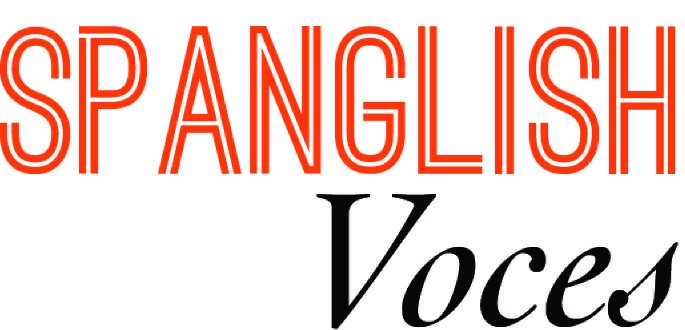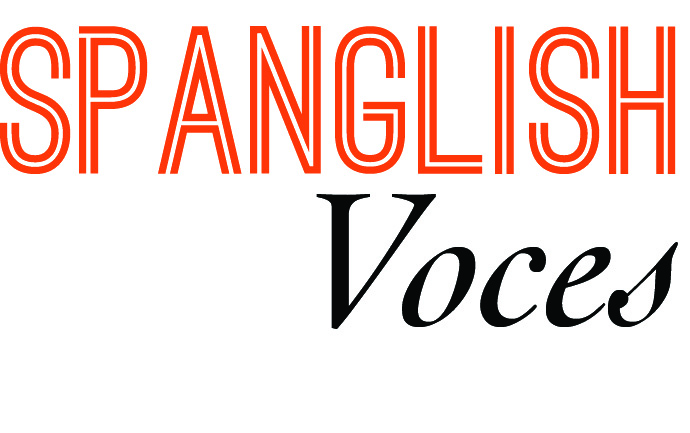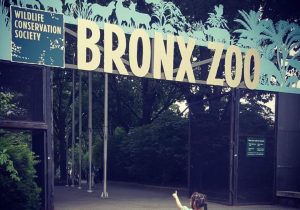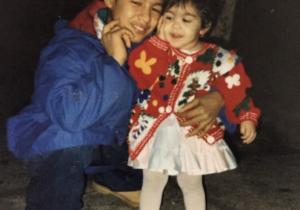“Opportunities like this come once in a lifetime, Flavia,” said Marisol in an officious tone.
She was holding one of Flavia’s hands and looking into her eyes as if she were disclosing the mystery of the Apocalypse. They had been in the same position for ten minutes, ever since Marisol had said, “We need to talk.” It was clear she had practiced her pitch: Miami is the place for you, forget about the United States, Miami is the best place in the world to live, and for Cubans, blah blah blah, these government regulations that take us in won’t last forever and you’re very young, girl! They’re not going to give you another visa to get in, this country is for young people, blah, blah blah, take advantage of this and stay. Stay here because in Cuba nothing’s going to change.
Flavia nodded. In Havana, Marisol had lived in a two-story house since girlhood in a residential neighborhood nicknamed Casino Deportivo. In Miami, she lived in a one-room trailer she’d bought in North West, one of two areas most frequently in the local news—and not for good reasons.
But Flavia didn’t feel like discussing Marisol’s version of happily ever after. At the end of the day, Marisol wasn’t the only one who had become an exact replica of the “revolutionary” demagogues she had once criticized so much. For some, Cuba was the best place in the world; for its adversaries—among them Marisol—Miami was the best place in the world. There was no middle ground for either of them. In Miami, Marisol was the fifth person who had told her to stay with such conviction.
The first had been Yoel, Marisol’s younger brother, when he did her the favor of picking her up at the airport. The second had been her distant cousin Hilda, a mother of four dependent on the Department of Children and Families. The third had been Yulitza. Flavia thought she remembered that being her name—Yulitza. To be honest, she didn’t really know her. She was a social worker whom she had bumped into at Hilda’s house the afternoon she went to visit her, but Yulitza had told her to stay as if she had known her all her life. The fourth had been Pepe, her old music professor. Marisol was the fifth, and Flavia suspected that this was due to the fact that she had only encountered five Cubans during her trip.
At first Flavia had tried to explain to some her decision to not stay in the city, but after a few semi-agitated discussions and accusations about how silly you are from that Yulitza, she decided to stop with the explanations. Professor Pepe’s heart attack was the last straw. He had become so upset when Flavia had been honest with him and told him that no, Miami didn’t seem at all like the place of her dreams and that capitalism was the same shit everywhere, that he had a fit right then and there. The fright that passed through her upon seeing Pepe grabbing his chest with both hands and coughing until his face was blue convinced Flavia that talking about politics and the economy in Miami was as useless as hoping to live long enough to see the end of the cold war.
Everyone needs their enemies to make them feel like they’ve made the right decisions in life. That’s why, when faced with Marisol’s arguments, Flavia limited herself to agreeing. Fifteen days after arriving and one heart attack later, she felt like a high-performance athlete in avoiding needless discussions. She didn’t even have to pay attention to the words. She knew that all the details came down to one single insistence: “Stay in Miami.” Or estey jir to say it in Spanglish, the city’s official language.
She put up with five more minutes of Marisol holding her hand and blah blah blahing: “Super expensive rents but blah blah blah; no medical insurance but blah blah blah; family plan, debts, but everything’s super great, blah blah blah … blah.”
“Thank you, Marisol, thank you,” Flavia said and finally wrestled her hand away from her friend, as if to grab her iPhone and check a nonexistent message that could have (meybi) arrived.
“Hey, Mari,” Flavia took advantage of the sudden silence, “thank you for agreeing to have a coffee with me. I know you have a lot on your plate. But I wanted to ask you if you know any Mexicans, or someone who is traveling to Mexico before the weekend, who could do me a favor and take an envelope to my husband.” Flavia was startled by the piercing cackle of Marisol’s nervous laughter.
“A Mexican in Miami? Oh, Flavia, you don’t know anything about life. If you want to see a Mexican, you’ll have to look in a construction site or a field or something like that.”
For a few moments, Flavia considered the possibility that Construction Site was another city in Florida she hadn’t heard of. But she remembered Augusto, Marisol’s husband, because someone had told her that ever since he arrived in Miami he’d worked for a construction company that built high-end condominiums.
“Oh, Mari, then doesn’t Augusto know any Mexicans from his work?”
Marisol got up from the table as if Flavia had insulted her mother.
“Well, I have to go. When are you leaving? Is there time for another coffee? I’m super busy, really super busy … Well, tell me, Flavia, hon, wake up. When are you leaving?”
Flavia hadn’t been sleeping. She’d begun to feel lethargic watching the flurry of words breezing nonstop out of Marisol’s mouth. And she was still asking herself what that city was called—Construction Site—that her friend had so vehemently refused to talk about.
“Flavia, sweetie, wake up.”
“Oh, yeah, yeah, Marisol, I’m leaving in a week. But, well, I wanted to find someone who would take this envelope to Mexico for me before that because if I send it by mail, we’ll basically arrive together.”
Once again it seemed that a bell had rung, snapping Marisol out of her trance.
“Well, Flavi, say hi to your mom for me.”
Distracted, Flavia nodded once again. The mention of her dead mother made her realize that either it’d been too many years since she’d spoken to Marisol or her friend had not paid attention to anything she’d told her over the first Cuban coffee they’d shared in the land of reunion.
Marisol got up from her chair and started to pick up her things scattered all over the table. As she put her pack of menthol cigarettes into her gold-colored purse, there was a burst of gestures and a stream of syllables. She told Flavia what lovely children one of her colleagues at work had, whom Flavia didn’t know but would surely love to meet, then grabbed her keychain with the three-inch American flag on it and remembered that the Colombian woman who had given her that beautiful keychain had eight dogs—eight dogs!—in the courtyard of her house. A purple sparkly matchbox brought on mention of her boss—a fifty-two-year-old, pregnant and with her hormones firing off, who was very upset lately, poor woman—and the whole world thought that her husband was cheating on her with someone else, a colleague from the same office whom Flavia also didn’t know, of course, but would surely love to meet. This woman, the boss’s husband’s lover, was the one who had given her the lace fan.
“Yes, yes, what a beautiful fan, and sure, I would love to meet your friend,” responded Flavia automatically as she began to feel hot just looking at Marisol put on her pink, rhinestone-encrusted coat.
“A coat, Marisol?” she had asked when she saw her friend getting in line for coffee under the full August sun, reserving her criticism for the fuchsia hue and the rhinestones on the back of the jacket. But seeing Marisol putting on the same jacket she’d just taken off, Flavia finally understood that the woman used those colors to fill a void in her life.
“Well, I better get back to work,” said the Cuban from Miami, again with excessive seriousness, as if all the details about all those people in another galaxy had brought her naturally to the same conclusion: “But think about it, estey jir and you can count on me.”
They exchanged noisy cheek kisses. Flavia watched Marisol’s pink rhinestone-encrusted coat as it melted into the distance. She sighed. It was ironic that that count on me had been said by the same woman who’d read Flavia’s WhatsApp message and didn’t get back to her for three days before agreeing to a coffee. In the distance, Marisol became a pink coat with two legs, then a pink coat without legs, then a shiny dot, then an unknown street.
Flavia gestured quickly to the waiter to pay the bill. From the bar he yelled, “Your friend already paid.” In an automatic reflex to ward off his yelling, she shrugged her shoulders. Upon seeing the gesture, the waiter understood that she had not heard him and repeated, “Your friend already paid, ya pagó, she paid!” He gestured with his right hand, making a cutting motion under his chin, meaning she paid, girl. Between kindly shouts that might have been death threats, Flavia left the café faster than the speed of light. She tried to hide under the table umbrellas in the patio among people drinking their coffees, stumbling and tripping until she saw the walkway beside the building and luckily—this was what she loved about Miami—the water’s edge.

Photo by Eduard Reboll.
She crossed the street. She retraced her steps along the sidewalk toward the sand and felt the heat of millions of rock crystals around her feet. She took off her new sandals carefully, thinking that, at this very spot in the universe, she could spend the whole afternoon with her bare feet kneading grains of sand. And, in reality, she did have the whole afternoon to be there. The rare books she’d come to look for at Museo Pérez had been scanned two days earlier; the same afternoon she’d signed an agreement that was going to make her business grow substantially. And she still had a week to explore every little bit of Miami Beach.
She’d promised Esteban she’d enjoy the trip—“Above all, the ocean that you miss so much, my love”—and they kissed each other for the last time at the entrance to customs. Peace returned to her when she thought about Esteban. He was so calm, so serene, what would he say about that whirlwind of people and memories his wife had encountered? Thinking about Esteban distanced her more and more from Marisol’s sermon, Pepe’s heart attack, the waiter’s shouting in the café—from that strange caricature of Havana she imagined she saw at every turn.
Shouts behind her made her feel the heat of the sand again.
“Flavia! Flavia!” It was Yelenis. “Girl, this truly only happens in Miami! This is so wild, running into you here.”
They hugged earnestly.
“Yele, it’s so good to see you, and you look so beautiful.”
“Why didn’t you tell me you were here in Miami, pretty girl? Are you staying or just visiting?”
“Oh, Yele, m’ija, I only came for a few days and I thought you were still in Brazil.”
“No, girl, I couldn’t renew my residency papers over there so I had to come up here two years ago. When it comes to Cuba—I’m not even going back there in a coffin. But come on, let’s go sit at the beach. Do you have time? This is such a coincidence! I come here every day to watch the sunset.”
The joy of meeting quickly dissipated. Fifteen minutes after their first hug, Yelenis became the sixth person in Miami to sing the same old song:
“You’re leaving in a week? Are you crazy? Opportunities like this don’t come twice in a lifetime, Flavia! Stay, girl, this is the best decision I’ve ever made.”
At this point Flavia had run out of patience.
“Well, Yelenis, don’t waste your breath with that same old estey jir or estey dear. I’m not staying in Miami.”
Yelenis had always seemed smarter than Marisol even though Flavia had stopped seeing both friends around the time they all started studying different majors at the University of Havana.
The sun started to disappear into the ocean in front of them, just like the last afternoon they had gotten together on the boardwalk in Havana. The southern coast of Florida is a very strange place. This area bestows the most beautiful orange sunsets in the world, but because of its position over the Atlantic, the sun’s silhouette does not reach the horizon. Perhaps that’s why Cuban migrants here can never escape the ghosts of Cuba. Because even though they have turned this city into a replica of their country, they still don’t have the shape of the stoic sun that melts into the ocean each afternoon.
Flavia felt that such an uncomfortable silence was unnecessary:
“Hey, do you know anyone who’s going to Mexico this—”
“What you’re doing is right,” Yelenis answered.
“What?”
“You’re right not to stay here. I came from Brazil because I had no other option. But this is hard, Flavi. This is really hard. And no, I don’t know anyone traveling to Mexico. I’m basically alone. This city is a machine that grinds up people, a work machine—shit with blush on.”
“Yele, what about your aunt? Hasn’t she been here for years?”
“Yeah, yeah, but I almost never talk to her. She has her things, her work, her grandchildren, you know, her life.”
“And do you talk to Marisol often?”
“Not really—just on her birthday, the Fourth-of-Yulai, other dates like that.”
“Do you know if she’s still with Augusto?”
The strangest thing about all this is that Miami’s orange sunset always becomes more intense the moment before it disappears.
“Yeah, yes,” answered Yelenis. “She’s still with Augusto, poor man, working like a dog in construction; he’s always working, but that dumb girl Marisol says that in order for the bank to not revoke their car loan, she has to tell everyone that Augusto is an architect and makes a ton of money.”
“And what’s that about, Yelenis? How does she pay for the car?”
“She doesn’t pay for it, sweetie. They say a Mexican is paying it, the bank manager, the one she’s cheating on poor Augusto with. Didn’t you see she even got silicone boobs?”
They both laughed with their entire bodies. They giggled slowly and with the ease of people with a shared history. Flavia experienced a certain schadenfreude with the story that was less dramatic than Pepe’s heart attack.
Gray filled the entire horizon. Flavia thought she heard in the distance, “Peanuts, hot roasted peanuts, get your peanuts here!” It was either by the street or in her memory from Havana. A peanut vendor in Miami? she thought. She was going to ask Yelenis but her friend stood up suddenly and said she was leaving:
“I’m on my bike. I don’t want it to get too dark.”
“Yeah, m’ija, I have to go too,” Flavia answered without clarifying that “leaving” meant leaving the beach, leaving Miami, the United States—that “leaving” meant changing her plane ticket to Mexico for the next morning, or that very night. As soon as possible, please she would say to the airline representative.
Aware that another goodbye was coming, when the two friends hugged after the fact, it seemed strange for them not to recognize the thinness in each other’s bodies that had remained consistent in their minds.
“It’s so good to see you, my friend,” Yelenis reacted to the strangeness.
“It’s so good to see you too, friend,” and she hugged Yelenis again, pinching her butt. They were the same girls they had been, and they were also the women they had become.
Flavia saw Yelenis’s black shorts bouncing along through the warm sand, getting further away among the palm trees that looked like a tourist brochure, among an even thicker silence than the one that had signaled her arrival. A little beyond where the sidewalk started, she also thought she saw the silhouette of a bicycle, rusted and lonely, chained to a post. She thought about Esteban again and how happy he would be when she brought back the signed partnership papers in person, even though this would mean that she had sacrificed a few extra days at Miami Beach. By changing her flight, she was certain to get to Mexico City in time to dine with the shareholders of the business she and Esteban had started five years ago. This had been her greatest achievement, and had paid for her trip to Miami: her hotel, her Uber to go and see cousin Hilda, her new sandals—this had been her success. She hadn’t been able to tell her old friends about it, and even if she had told them, they might not have even been able to hear her.
Who would have thought that she would feel closest to her real self in Mexico City—that overcrowded desert-like place so far from the ocean where she had arrived as an exchange student at twenty years old.
She had to admit that maybe the problem wasn’t the ocean, maybe her problem was Miami, a too identical copy of Havana where, in spite of everything, something was always missing. Who could be sure … Maybe this was really all about the orange silhouette of a stoic sun melting into the horizon each afternoon.
Flavia slipped her iPhone out of her pocket and took a selfie. It wasn’t gray. The entire phone screen was black.
“It’s good like that.” There are moments we need to capture and keep forever.
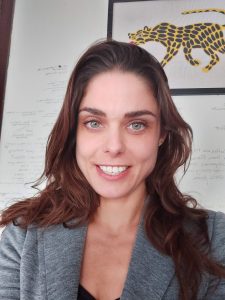 Jesse Tomlinson is a Canadian literary translator and interpreter living in Guadalajara, Mexico. Her portfolio of Spanish into English translations can be found here: tomlinsontranslations.com/portfolio/publications. You can follow her here: @tom_trans, jessedoinginsta.
Jesse Tomlinson is a Canadian literary translator and interpreter living in Guadalajara, Mexico. Her portfolio of Spanish into English translations can be found here: tomlinsontranslations.com/portfolio/publications. You can follow her here: @tom_trans, jessedoinginsta.
Jesse Tomlinson es una traductora literaria e intérprete canadiense que vive en Guadalajara, México. Su portafolio de traducciones del español al inglés se puede encontrar aquí: tomlinsontranslations.com/portfolio/publications. Síguela aquí: @tom_trans, jessedoinginsta.
 Dainerys Machado Vento is a Cuban journalist, writer, and literary researcher. She is the author of Las noventa Habanas, a collection of short stories published by Katakana Editores in 2019. Dainerys is a PhD Candidate in Literary, Cultural, and Linguistic Studies at the University of Miami. You can follow her here: @Dainerys_MV, dainerys_mv.
Dainerys Machado Vento is a Cuban journalist, writer, and literary researcher. She is the author of Las noventa Habanas, a collection of short stories published by Katakana Editores in 2019. Dainerys is a PhD Candidate in Literary, Cultural, and Linguistic Studies at the University of Miami. You can follow her here: @Dainerys_MV, dainerys_mv.
Dainerys Machado Vento es una periodista, escritora e investigadora literaria cubana. Es la autora del libro de cuentos Las noventa Habanas (Katakana Editores, 2019). Es candidata a Doctora en Estudios Literarios, Lingüísticos y Culturales por la Universidad de Miami. Síguela aquí: @Dainerys_MV, dainerys_mv.
